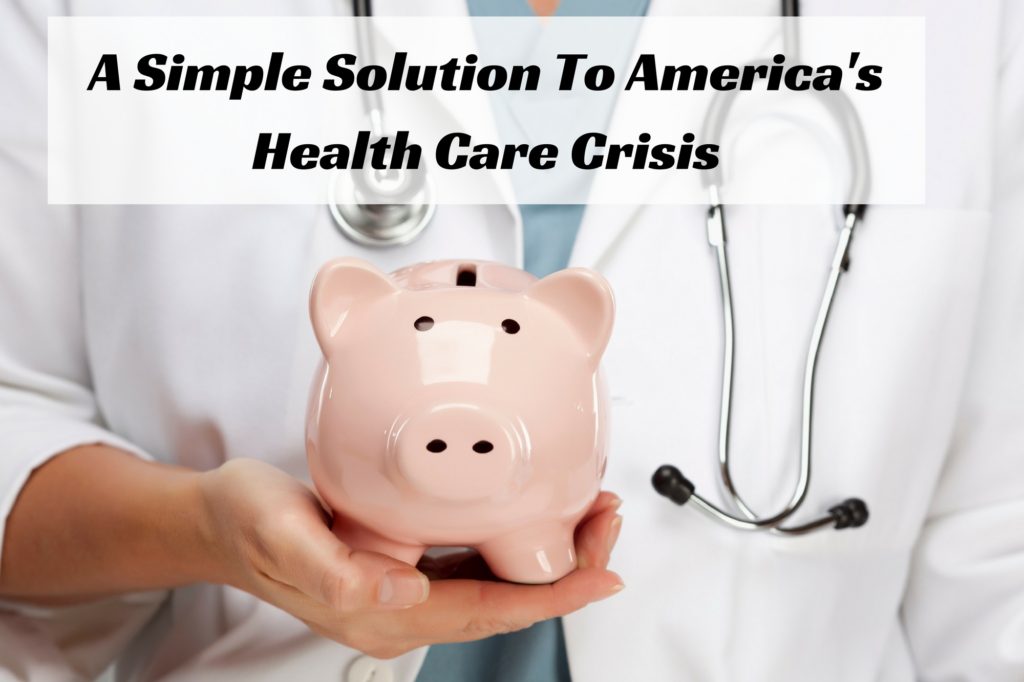I have a question for you…
“What is the one industry that you can walk into an establishment and not know what you are going to pay before you get your goods or services? It is this industry where if you ask the price for their service they will say they cannot tell you or don’t know?”
You might guess the legal profession. I have never met an attorney who wants to give an estimate on their services, but they do tell you the hourly rate, so at least you have some sort of baseline to compare with other attorneys.
It’s not the legal profession.
It is health care.
Now before you run away screaming at the thought of someone discussing health care, Let me tell you that this is a conceptual piece that lacks politics (YAY!) or hard data. The point of this post is to take a step back from the problem and view it from a different lens. Once you bring in politics and statistics the discussion tends to be skewed in one direction or another.
Hospitals and medical care facilities
If you walk into any hospital in the U.S. and ask for how much it will cost you for a surgical procedure. What would be their reply? In most cases, it would be “I don’t know.” Perhaps some other people would say, “I can’t tell you”. This might be true if you account for the fact that prices vary, whether you have insurance vs. if you don’t have insurance. Frequently, people with insurance have a rate discounted by the insurance company before their insurance company begins to pay for the treatment. Can I get those discounted rates without insurance? Not unless you are a good negotiator.
What is the price of your health care?
Perhaps, one of the reasons that health care in this country is so expensive is that people do not know the costs?
If I wanted to buy a laptop computer, would you just walk into an electronic store and ask the greeter or customer service person to just give you a laptop? Would you just say give me what you have? One that I can turn on and type with, and hope you got one that met your needs? Would you give them your electronic store card and walk out only to find out what they actually charged you a month or two later?
No. I’m sure almost no one does this. What most people do is they figure out exactly what they want. How much memory they need, the weight of the laptop, the battery life, what type of graphics card, the storage capacity, what operating system, what brand, etc.
The last time I bought a laptop I spend days analyzing exactly what I needed, then I shopped around to find the best place to buy one at the cheapest rate. I was not looking for a cheap laptop mind you. I was looking for a higher-end one. For my work, I cannot afford to buy something cheap, only to buy another one next year. I want a solution that will last me for years. I also made sure that the laptop I bought was a good value. I certainly could have bought a more expensive one, but the cost would have far outweighed what I needed.
In a nutshell, I was cost conscious. I was the typical consumer in an efficient economy. People like me force the market in laptops to become efficient. This brings down costs for everyone. It forces companies to produce the best laptops at the lowest prices. If they don’t, then they will be out of business. When companies started making laptops, there were over 20 companies competing for market share. Remember the Commodore 64? Now, there are only a handful of companies remaining.
What if the only way you could buy a laptop was the same as how our health care system worked? You were not allowed to make any product comparisons based on price. You could choose a high-end laptop, or you could choose a mid- or low-end one, but you would not know the price or any details about it.
I suspect laptops would cost $15,000 at the low end.
Why don’t hospitals provide you with prices?
 The fact is that our health care system is not set up very well. There are many reasons for this.
The fact is that our health care system is not set up very well. There are many reasons for this.
Some people blame the insurance companies… True
Some people blame the hospitals… True
Some people blame the drug companies… True
Some people blame the medical device companies… True
And some people even blame the government… True
No one blames themselves…Bingo
Everyone is to blame. The current system is flawed.
The basic process of the consumer making a choice based on price does not exist. In most competitive industries companies compete with each other driving down the prices and costs to produce their products. The result is the consumer gets a better product at a lower price. However, in health care it does not work this way.
Insurance companies compete on price with each other but the government approves what they can charge.
Drug companies invent new treatments for diseases and choose the price for the treatment because they have a monopoly based on their patents.
Government oversight mandates certain requirements and pricing on the entire health care industry based on negotiations and best guess approximations, not on free market pricing. Government involvement rarely makes prices more competitive.
Hospitals merge into mega hospitals to reduce their costs through economies of scale. They don’t pay taxes yet they charge a lot of money for their services.
Yet, somehow the consumer does not get to make their decision based on price. Everyone in the heath care industry gets to make some decision based on their own best interest, except the end consumer. Due to the lack of price competition, there is very little incentive to compete for the consumer’s wallet. All of the health care service providers have access to the consumer’s wallet without having to compete, thus prices are high.
Fortunately, there is hope in our health care crisis
There are doctors who have figured out that they can make money without accepting insurance. They have figured out how to compete for customers without accepting insurance and the burden it entails. These doctors have created their practice which has two people: the doctor and an assistant. They only accept cash (cash, checks, or credit cards) for their services. They do not accept insurance for payment, thus they don’t need to hire 3 or more insurance coordinators for the office to handle the insurance claims, follow up, payment disbursement, etc. It is a simple cash for services transaction. What a novel idea.
This is not the silver bullet to the health care crisis, but it is a start.
These doctors are not set up for all health care concerns. If you go to one of these doctors for heart surgery, they are not setup for this type of service. Hospitals are much better equipt to handle certain types of care. However, most simple visits (feeling sick, need a flu shot, need stitches, etc.) don’t require people to visit a hospital. These types of doctors can charge $50-75 per visit and still make their profession profitable. It is certainly cheaper than my paying $150-$300 for the same visit at a hospital with insurance, plus additional money for the doctor to rent the room to see me. What a racket. It is certainly better than being made to pay $1,000+ per month in health insurance whether you use it or not.
Most simple visits (feeling sick, need a flu shot, need stitches, etc.) don’t require people to visit a hospital. These new types of doctors can charge $50-75 per visit and still make their profession profitable. It is certainly cheaper than me paying $150-$300 for the same visit at a hospital with insurance, plus additional money for the doctor to rent the room to see me. What a racket. This is on top of paying $1,000+ per month in health insurance whether you use it or not.
Why does insurance exist?
The point of insurance in any other area of your life is to protect you from loss, not equalize payments for expected services. If you own a house, you have fire insurance. Let’s say it costs you $1,000 per year and your house is worth $100,000. You pay the premium expecting to never need it, but if you need it, then you don’t need to pay the $100,000 to replace the house out of your pocket. If you never need it, then the insurance company makes the profit. That is the point of insurance.
The insurance companies write thousands of fire policies in the hopes of spreading the risk across many people so when one person’s house burns down, they can pay the claim and still make a profit. However, if half of the insurance company’s fire insurance policies had fires, the insurance company would not make a profit. They might not be able to pay all the claims.
The only health insurance that should be considered is one that protects from highly expensive treatments which could run into the $100,000s of dollars. The kind that most people don’t need. This would be a sustainable health insurance model.
Let’s take this example back to your home. If you wanted house insurance that covered everything (light bulbs burning out, scratches on the floor, weeds on the lawn, repainting the house, replacing furniture, etc), then house insurance would also cost a lot more annually. Maybe housing would have the same problems as we are having with health insurance and medical costs. Maybe someday the government will mandate that we carry such insurance. I hope no insurance lobbyists are reading this post…
Our current health insurance system is set up so that we (or our employer) pays a monthly premium and some or all of our heath care needs are covered by this insurance. We (as individual consumers) are effectively removed from the market pricing equation. We have no power to negotiate on price. The health care provider is essentially negotiating with the health insurance company over price. You have no say in the process, so the result may not always be in your best interest. Is it becoming clear to you?
Furthermore, many people do not pay more than a negligible amount (co-pay) for each service visit. It is a well-known fact that when people do not pay for a service, they do not treat it with scarcity (meaning a limited supply). Paying $20-$30 per visit does not give you an appreciation of the actual costs that are being paid.
What is the solution?
Starting from scratch, the solution would be easy. Given our existing health care system, the solution would be hard. And each additional government involvement makes the solution harder. However, given the innovative spirit in this country, change will happen, but only if it is allowed to germinate. Only then can the solution grow out of our existing system.
I know our existing system is broken and only getting worse. I know that government mandates and intervention almost always makes things worse in a free market system. I know that medical innovations will only get more expensive. And, I know the medical system is based on care, not prevention. However, I also know that this country was built by capitalism, and has continued to thrive on innovation. I know that there are solutions out there being tried, doctors who want change, and I know that consumers will one day wake up and say they want what they want, and that will include a system that works properly.
One day people will wake up and realize that what drives change is the consumer, not the health care providers, not the insurance companies, and not the government. The consumer is in control, they just need to own their role as a driver of change.
The three simple words you have been looking for… Free Market Prices
If you want to learn more about Innovative Advisory Group or Kirk Chisholm, you can contact us here:
About the author: Kirk Chisholm is a Wealth Manager and Principal at Innovative Advisory Group. His roles at IAG are co-chair of the Investment Committee and Head of the Traditional Investment Risk Management Group. His background and areas of focus are portfolio management and investment analysis in both the traditional and alternative investment markets. He received a BA degree in Economics from Trinity College in Hartford, CT.



